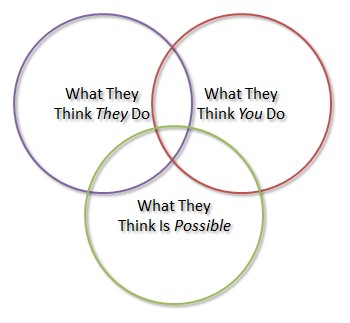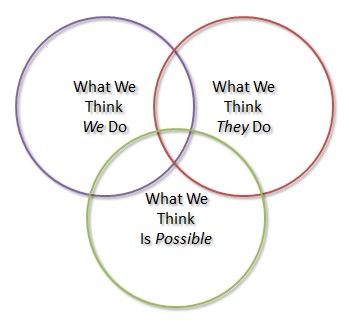Greetings,
I had a great talk with a technology CEO today, and we talked about how the perceptions of a prospect/customer can impact the sales cycle. While we want to, or even assume, that everyone knows all about or fancy new shiny toy (software), this is seldom the case. If you aren’t a brand name, welcome to the struggle.
I used to say that you know you are cutting edge or have a good/new idea, when you spend 1/2 your time explaining WHAT you do, and the other 1/2 talking about why the prospect/customer needs what you are selling.
But these days it’s a more complicated story I tell. For example, I would represent our discussion this morning more like this:
 3 Ring Circus – Prospect Perspective
3 Ring Circus – Prospect Perspective
Some of this is easy to figure out, some not.
What They Think They Do
as an enterprise sales engineer, I can tell you that this is not as predictable as you might think. Ask each person in a company what they do, and you will not get the same answer. Below The Line, you might hear “We Solve Problems”, and they would go on about what kind of “pain points” they solve. This is Tactical Selling. I never use the term “pain points” in a meeting, or, well, ever because it is not the way to do enterprise sales [well].
If, on the other hand, you ask someone above The Line, they will say “We Create Opportunity”, and they will go on about opportunities for their share holders, management staff, and growth. Even then, each will describe a different opportunity… You see where this is going.
What They Think You Do
I love this one. I can’t tell you how many times I’ve asked “What keeps you up at night?”, and heard “XYZ, but you guys aren’t involved with that.”-and of course, we actually did. So what is the issue at plpay here?
You remember earlier when I was talking about 1/2 your time talking about what you do? This is it. Come to find out, even though we use our technology on a daily basis, not everyone else does. What is worse, if this has happenned to you, then you are not in control of your image.
What this means is, the market/vertical/specialty that you play in has been advertised & marketed for you. Someone else has taken this job on for you, and there is a 99% they were/are wrong. If it was TV/Rags/Media, then it is easily reparable. If it is from a competitor, though, it is much more insidious. Often times, the prospect will tell yo uwhere they heard this if you ask, so ask!
What They Think Is Possible
This is what our discussion brought out. It is actually a more subtle aspect of the “What They Think You Do” circle above. This is the perception (isn’t perception reality) that they already know (so they think) everything in the realm of possibilities. It means that the prospecct is certain they know what can be done for them, and they are just shopping for someone to do it. Well, as I’ve said on many occasions, “The surety of a prospect that they know their issues/problems is inversely proportional to the truth.”
Why is this the case? Well, it’s really because they are not experts in what you do, but they do not want to appear to be uneducated about what you do. They have many technologies from many markets/verticals at play at their company, yet their company may have nothing to do with any of them. How does the head of a shoe company become an expert DBA? Or more germane to our discussion, how is an executive at a non-IT company able to keep up with the myriad of technological advances, along with emerging providers, that are out there? True, they are interested in hearing what other companies like them are adopting (some markets are unhealthily habitual like this: Insurance & Finance leading the pack), but beyond that, they really know nothing.
You need to be expert at manipulating conversation to understand these subtle dynamics, and give them what I call “A Way Out” of being either uninformed, or worse yet, dis-informed. You need to be gracious.
So with these 3 circles, imagine your last call/solution/sale. How closely were these 3 circles overlapping each other? Were some or all disconnected completely? This is why you will hear people talk about a “complete disconnect” when they are talking about qualification (another topic we’ve dug deep into on this blog).
The more these 3 overlap at the front end, the shorter the sales cycle, and the higher the likelihood of closing-and both of those make everyone on your team happier!
Now this is all well & good, but as the title alludes, this is only their perspective. The sale takes more than just them, though! It takes you, and what you do. So as you can imagine, there is another key perspective set to look at, and that is from our perspective:
What We Think We Do
This is the start of our perspective. Things here are just as important, but much harder to face. We are inherently dishonest with ourselves [in business]. But once again, if you ask the tactical/technical in your company, they will say “We Sell Drills!”. But if you ask the strategic/solution executives & managers, they will say “We Sell Holes!”. Do you see the difference?
One is concerned with selling as many drills as possible, focusing on features like speed, durability, and specs. They will list all the features and say “There is no product like it!”.
But what of our strategic employees? What of our enterprise sales? What will they say? We already know they say “We Sell Holes”, but what does that mean? We don’t really charge “By The Hole“, do we?
Of course not. What it means is that we sell a world with holes that we have drilled. Strategic selling deals with painting a picture of how things could be. We capture imaginations, create dreams, and drive opportunities for (you name it).
I have an easy to remember axiom to remember selling tactically or strategically:
A prospect/customer has one of 2 things:
1. They have something they don’t want (problem to fix/tactical)
2. They want something they don’t have (opportunity to take advantage of/strategic)
Well, they can have both at once, of course, but I was talking about each individual DSO (Discreet Sales Opportunity).
So just like the Good/Fast/Cheap triad, these 2 simple triads should remind you that there are 2 ways to look at each opportunity. Their way, and yours!
pat :)


